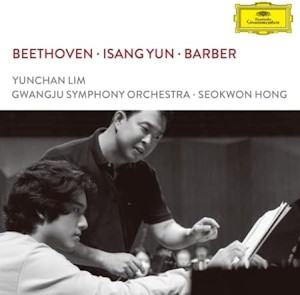
Ludwig van Beethoven (1770-1827)
Concerto for Piano and Orchestra No.5 in E flat major “Emperor” Op. 73 (1809)
Isang Yun (1917-1995)
Exemplum in memoriam Kwangju (1981)
Samuel Barber (1910-1981)
Adagio for Strings (1936)
Federico Mompou (1893-1987)
Jeunes files au Jardin No.5 from Scènes d’enfants Calme (1918)
Alexander Scriabin (1872-1915)
Poème Op. 69/1 Allegretto (1913)
Feuillet d’album Op. 45/1 Album piacevale (1905)
Yunchan Lim (piano)
Gwangju Symphony Orchestra/Seokwon Hong
rec. 2022, Tongyeong Concert Hall, Gwangju, South Korea
Deutsche Grammophon 4858327 [76]
Yunchan Lim, the young, astonishingly talented South Korean pianist, has kept himself busy in the year and a half since he won the 2022 Van Cliburn International Piano Competition at age 18. The trajectory of his travels can be traced without too much difficulty on YouTube; all of his Cliburn Competition performances are there, both solo and concerted, as well as a variety of more recent concerto and solo performances. Lim’s semifinal recital at the Cliburn, a majestic traversal of Liszt’s Transcendental Etudes, reviewed here in the most glowing terms by Nick Barnard (review), was published earlier this year by Steinway & Sons.
Lim’s first commercial release, for DG/Universal Music Korea, issued late last year, however, is quite a different musical experience. Rather than recording a solo disc or a blockbuster concerto in the studio (such as the Rachmaninoff Third which he so memorably conquered at the Cliburn), Lim and Universal have issued a memento of a live orchestral concert from October 2022 that features the Gwangju Symphony Orchestra under the direction of Seokwon Hong. Lim is the soloist in Beethoven’s Emperor Concerto and also performs several encores. The centerpiece of the program is Isang Yun’s Exemplum in memoriam Kwangju, which is followed by Barber’s Adagio for Strings. No doubt the concert was a powerful musical experience heard live, and as recorded here orchestra and piano alike have an admirable presence and clarity.
But by itself this recording provides a less-than-perfect vehicle with which to evaluate Lim’s gifts, since he is featured only on a portion of the disc. To begin at the end, the solo works are quite lovely, demonstrating the pianist’s natural sensitivity and his instinctive freedom. ‘Jeunes filles au jardin’, from Mompou’s Scènes d’enfants, has an appealing flexibility quite appropriate to the character of this miniature, though one might wish for a touch more simplicity, as in the post-war Columbia disc of Guiomar Novaes (now on APR; the composer himself seems to me to miss the mark by quite a bit in his 1974 Ensayo disc). Lim is well-attuned to Scriabin’s perfumed, improvisatory sound world. Here he plays the first of the Poèmes, op. 69, and the Feuillet d’album from the Trois Morceaux, op. 45. (For another example of Lim’s Scriabin, you can find the Sonata no. 2, op. 19 ‘Sonata-Fantasy’ on the quarterfinal recital at the Cliburn as well as at an August 2022 concert in Duszniki, Poland (both available on YouTube).)
The opening movement of the Beethoven concerto has a directness and forward momentum that is quite appealing. although in places (especially in the first-movement development) the orchestral contribution is overly recessed compared to the piano, unnecessarily highlighting figural detail when we should hear more interesting, even playful, give-and-take. (A live Lim performance of the ‘Emperor’ from February of this year, with the Tokyo Philharmonic conducted by Mikhail Pletnev, is more convincing in this regard (YouTube).) The Adagio flows well, and Hong’s lovely strings provide a poised underlay for Lim’s floating legato figuration, though towards the end the woodwind phrases tend toward shapelessness. The Rondo is less successful, both because Lim’s phrasing of the main Rondo theme is ungainly and awkward (he smooths this out in the more recent Tokyo performance), and because the whole tends to meander just a bit.
Nearly half the disc is made up of purely orchestral works. Isang Yun’s eventful career was based mostly in Germany (and includes a bizarre chapter in which he was kidnapped by South Korean forces in West Berlin and imprisoned in Korea for several years). Exemplum in memoriam Kwangju, for large orchestra, dates from 1981, and was written in response to the popular demonstrations in Gwangju in 1980, in response to the brutal repression that followed the assassination of Park Chung Hee in 1979. The work seems very much of its time, and its structure is coherent and convincing. The first section (approximately the first half of the piece) is militant and aggressive, drawing on masses of orchestral sound. The Gwangju Symphony copes reasonably well with the orchestral difficulties, although the loud brass choir passages are something of an adventure. A middle section of vast quiet follows, with a gradual increase of energy. This sets up the final section, in which vibrant bursts of color and rhythmic ostinati lead to a massive and, I think, optimistic, climax. (Kudos to the timpanists and other percussionists.) The Gwangju forces are much more vibrantly recorded than the dim-sounding Pyongyang orchestra was in 1986, the only other performance I’ve heard (cpo 9990472).
The Barber Adagio, which never fails to please, is given a loving and shapely reading by the strings of the Gwangju orchestra, though in the first half of the piece we miss the intensity at low dynamic levels that marks the most searing performances. It makes a surprising and rather compelling addendum to the Yun Exemplum.
Yunchan Lim signed with Decca Classics earlier this fall; his first release for that label is scheduled for release in spring 2024. The present disc is useful as a representation of an early stage of this fine young artist (still just 19!); it provides just a glimpse of his prodigious talents, which we are sure to enjoy for many decades to come.
Jeffrey Hollander
Previous review: Marc Bridle (December 2023)
Help us financially by purchasing from



















